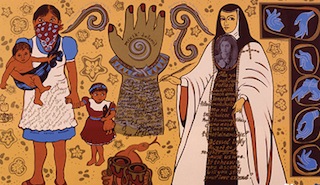
CCM's "El Niño" Reverential, Emotional
John Adams’ oratorio “El Niño” had its regional premiere in
Cincinnati March 2, and it couldn’t have been in better hands. Earl Rivers,
director of choral studies at the University of Cincinnati College-Conservatory
of Music, was prime mover and executant, leading ensembles of CCM in a
performance that alternately intrigued, touched and pinned one’s ears to the
wall. The 2000 oratorio centers on the birth of Jesus, with a frame of
reference encompassing the human experience from birth to violent death. The
text, sung in English, Spanish and Latin and drawn from a variety of sources, was
projected onto a screen over the stage.

The soloists were soprano Kerrie Caldwell, mezzo-soprano Leah de Gruyl, baritone Edward Nelson and countertenors Michael Maniaci, Eric Jurenas and Steven Rickards (all but Rickards are students or alumni of CCM). The 63-piece orchestra included two amplified steel-stringed guitars, piano, sampler, celeste and myriad percussion, including a set of tuned cowbells. What Adams does with this assemblage is magical, all of it superbly realized by the CCM forces.
“El Niño” means “little boy,” any reference to the cataclysmic storms of the same name completely intentional by Adams. It begins with his stereotypical chugging figures and is informed by minimalism, rock, jazz, you name it. The opening chorus, “I Sing of a Maiden,” built to a climactic cut off, followed by soprano Caldwell and the countertenors in “Hail Mary, Gracious!” (from the Wakefield Mystery Plays). This was followed by “La Anunciación” by Mexican poet Rosario Castellanos, the first of several texts by Hispanic authors used in the work. A gripping evocation of childbirth, it was sung with deep feeling by mezzo de Gruyl. Caldwell’s “Magnificat” (from the biblical Gospel of Luke) was softly reverential by contrast.
Like Handel’s “Messiah” (Adams’ inspiration, he said), “El Niño” is a mix of choruses and arias, much of it reflecting on the action and without characters as such. A striking exception was “Now She was Sixteen Years Old,” where baritone Nelson voiced Joseph’s anger at finding Mary pregnant. “Joseph’s Dream” which followed -- a beautiful movement for baritone and countertenors in which Joseph is reassured of Mary’s innocence --was colored by English horn. In “Shake the Heavens,” Adams’ deliberate nod to “Messiah,” Nelson executed some nimble coloratura.
Caldwell and de Gruyl’s “Se habla de Gabriel” (Castellanos), also addressing the rigors of childbirth, was extremely moving, followed by Nelson intoning apocryphal texts about heaven and earth standing still. Part one closed with “The Christmas Star” by Chilean poet Gabriela Mistral, which also included ecstatic verses by medieval composer/writer Hildegard van Bingen (“O quam preciosa”).
Part two opened with de Gruyl’s lovely, reflective “Pues mi Dios ha nacido a penar” (“Because my Lord was born to suffer”) to a text by 17th-century Mexican nun Sor Juana Inés de la Druz. This portion of the oratorio tells the story of Herod, the Three Wisemen and the slaughter of the children of Bethlehem. Adams veers into boogie-woogie -- flavored with scrapes of guiro -- in “When Herod Heard,” given a zesty performance by Nelson and the countertenors. The three countertenors sang Nicaraguan poet Rubén Darío’s “The Three Kings,” each in turn, over an atmospheric setting by the orchestra. After a sharp report of chimes, the chorus virtually screamed “And he slew all the children,” from the Gospel of Matthew.
“Memorial de Tlatelolco” by Castellanos, recalling the victims of a 1968 demonstration in Mexico City, was the emotional highpoint of the performance. Here Caldwell expressed outrage and tenderness, even a long wail near the end. This was followed powerfully by “In the Day of the Great Slaughter” (from the Book of Isaiah), where slashes of violin recalled Bernard Herrmann’s score for the film “Psycho.”
The oratorio closed with a pair of texts from the apocryphal Gospel of Pseudo-Matthew about miracles performed by the child Jesus. In “A Palm Tree,” Jesus causes a tree to bend and offer its fruit to the Holy Family and to produce water from its roots. Here de Gruyl, Nelson and the countertenors were joined by the Cincinnati Children’s Choir in additional verses by Castellanos, ending softly on the word “Poesía” (“a poem”).
(first published at www.ConcertoNet.com)